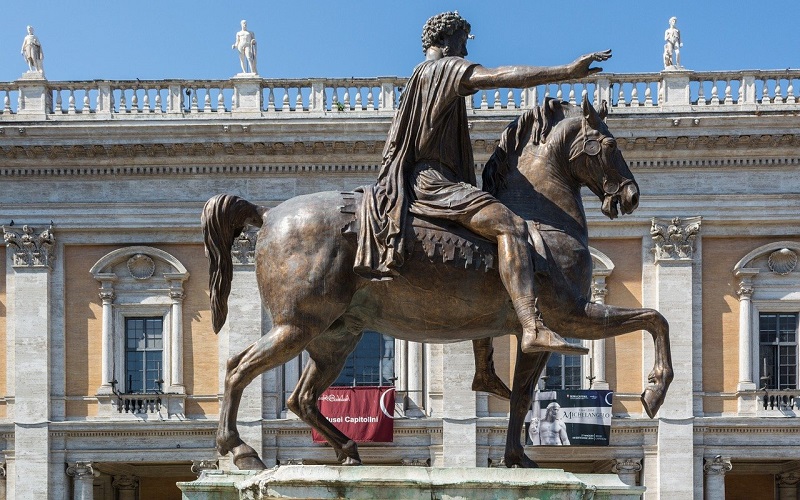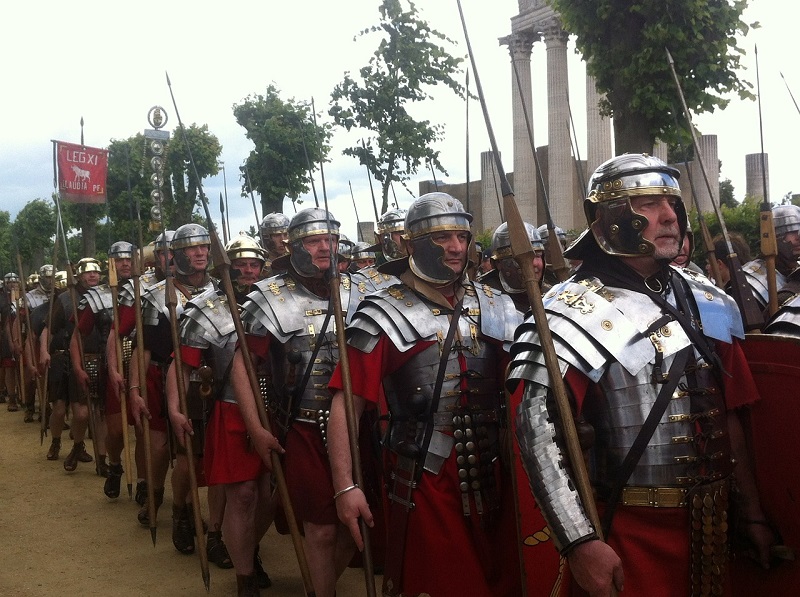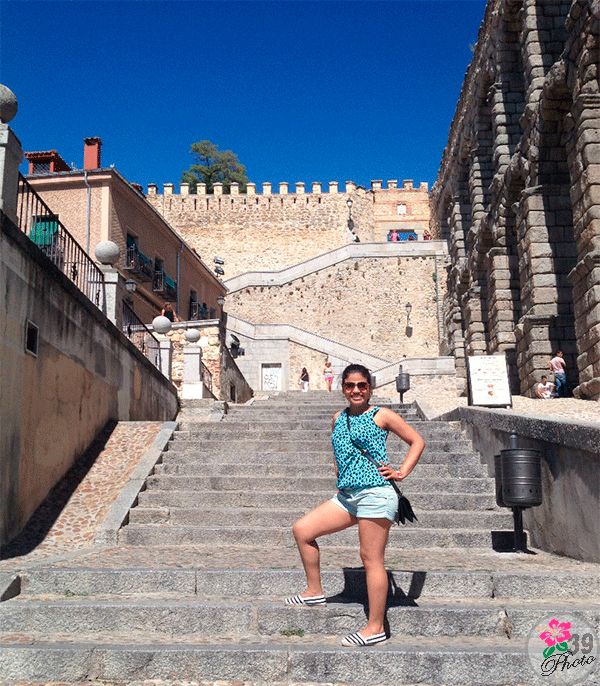The story of the emperor who died fighting the first global pandemic 💀📿[La historia del emperador que murió luchando contra la primera pandemia mundial]
Estimados Steemians
Dear Steemians
El 17 de marzo del 180 en nuestra era (n.e), en la antigua población de Vindobona, provincia de Panonia, muere el emperador Marco Aurelio. Vindobona era un asentamiento humano compuesto por unos 20.000 habitantes, entre ellos al menos 6000 eran militares romanos y en su gesta bélica se encontraba el máximo líder romano, allí donde hoy se encuentra muy cerca la ciudad de Viena, en la margen del Danubio bajo una espesa vegetación y un clima aterrador da su último aliento Marco Aurelio.
On March 17, 180 A.D., in the ancient town of Vindobona, in the province of Pannonia, Emperor Marcus Aurelius died. Vindobona was a human settlement of about 20,000 inhabitants, among them at least 6000 were Roman military men and in his warlike deed was the maximum Roman leader, where today is very close to the city of Vienna, on the bank of the Danube under a thick vegetation and a terrifying climate gives his last breath Marcus Aurelius.
Fue el último de los cinco emperadores buenos, calificación que dio Nicolás Maquiavelo y se encargó de promover el historiador Edward Gibbon. Marco Aurelio tenía una amplia y práctica experiencia política, su formación filosófica de corriente estoica le favoreció durante su gobernabilidad y mantenimiento del status quo de la conocida dinastía antoniana, de esta deriva el sustantivo de la epidemia que azotó y diezmó el imperio romano, pandemia antoniana. Se considera como la primera pandemia mundial que ha ocasionado la paralización del aparato productivo, social, económico, cultural, religioso e incluso militar; ya que Roma se vio obligada a cesar sus acciones bélicas y retirarse del frente de batalla por el colapso de su componente humano.
He was the last of the five good emperors, a qualification given by Niccolò Machiavelli and promoted by historian Edward Gibbon. Marcus Aurelius had a wide and practical political experience, his philosophical formation of stoic current favored him during his governance and maintenance of the status quo of the known Antonian dynasty, from this derives the noun of the epidemic that hit and decimated the Roman empire, Antonian pandemic. It was the first world pandemic that caused the paralysis of the productive, social, economic, cultural, religious and even military apparatus; since Rome was forced to cease its warlike actions and withdraw from the battle front because of the collapse of its human component.

Imagen de Serghei Topor en Pixabay
El origen de la enfermedad puede rastrearse en fuentes históricas que conducen al 165 de n.e en Seleucia (Mesopotamia), territorio oriental del actual Irak; donde un intrépido militar de la legión comandada por Lucio Vero, hermano de Marco Aurelio; profanó una cripta que contenía el cuerpo y objetos valiosos de un antiguo sacerdote del templo de Apolo, al abrir la lápida se liberó una sustancia en forma de vaho putrefacto que impregnó el cuerpo del saqueador y posteriormente se diseminó en sus compañeros de armas.
The origin of the disease can be traced in historical sources leading to 165 of the year. e in Seleucia (Mesopotamia), eastern territory of present-day Iraq; where an intrepid soldier of the legion commanded by Lucius Vero, brother of Marcus Aurelius, desecrated a crypt containing the body and valuable objects of an ancient priest of the temple of Apollo. When the tombstone was opened, a substance in the form of rotten mist was released, which impregnated the body of the looter and subsequently spread to his comrades-in-arms.
De esta manera la población de soldados empieza a experimentar síntomas de decaimiento, sudoración excesiva, aparición de erupciones cutáneas después de una semana, protuberancias con sustancias purulentas que posteriormente se hundían desde el centro y se convertían en costras secas que se desprendían; llegado este momento, el paciente agudizaba y experimentaba vómitos acompañado de evacuaciones hemorrágicas, para luego morir; después de muchos años, la comunidad científica en el último tercio del siglo pasado indicó que se trató de viruela hemorrágica, una potente enfermedad infecciosa causada por el contagio de Variola virus.
In this way the population of soldiers begins to experience symptoms of decay, excessive sweating, appearance of skin rashes after a week, bumps with purulent substances that subsequently sink from the center and become dry scabs that fall off; At this point, the patient would become more acute and experience vomiting accompanied by hemorrhagic bowel movements, and then die; after many years, the scientific community in the last third of the last century indicated that it was hemorrhagic smallpox, a potent infectious disease caused by the spread of Variola virus.
Por supuesto, para la época de Oro del imperio romano no existía la tecnología ni avances médicos que determinarán esto y cómo controlar la situación sanitaria. Ante la autodestrucción inminente del ejército, Lucio Vero decide retirarse y regresar a Roma para que los enfermemos recibieran tratamiento médico y se reorganizara la legión a fin de defender la parte oriental del imperio. Hoy se conoce con propiedad el impacto terrible de esta enfermedad. Marchar más de 1300 kilómetros por un montañoso y emboscado camino con un componente abrumador de hombres en su mayoría enfermos, era un verdadero suicidio.
Of course, for the golden age of the Roman Empire there was no technology or medical advances that would determine this and how to control the health situation. Faced with the imminent self-destruction of the army, Lucius Verus decided to withdraw and return to Rome so that the sick would receive medical treatment and the legion would be reorganized to defend the eastern part of the empire. Today the terrible impact of this disease is well known. To march more than 1,300 kilometers through a mountainous and ambushed road with an overwhelming component of mostly sick men, was a true suicide.
 Imagen de Judith Meyer en Pixabay
Imagen de Judith Meyer en PixabayEn la actualidad con tecnología aeronáutica es aproximadamente 10:30 horas de recorrido; sin embargo, se trató de un itinerario que comprendía semanas de marcha por las condiciones expuestas. En su paso por aldeas y pueblos fueron dejando enfermos de gravedad y muertos. Una legión que no contó con seguridad y normas sanitarias, en poco tiempo se propagó el Variola virus a toda la población militar. Se dice que su comandante Lucio no soportó entrar con vida a Roma, falleció tras ser contagiado y presentar un cuadro deplorable de salud.
At present, with aeronautical technology, it is approximately 10:30 hours long; however, it was an itinerary that included weeks of walking due to the conditions exposed. As they passed through villages and towns, they left seriously ill and dead. A legion that did not have safety and sanitary regulations, in a short time the virus spread to the entire military population. It is said that its commander Lucio could not bear to enter Rome alive, and died after being infected and presenting a deplorable picture of health.
Con la llegada del resto de legionarios a Roma, el huésped buscaría rápidamente miles de hospedadores y en pocos años se convertiría en millones de contagiados. El imperio romano sintió la arremetida de un verdadero enemigo, sigiloso porque penetró con la ayuda de sus más fervientes aliados, astuto porque iría acabando con la paz y seguridad de la gran Roma, la impenetrable fortaleza; aterrador porque sembró el pánico en la sociedad, implacable porque no hubo distinción de clase social, menos imperial porque Lucio, hermano del Emperador había caído sin clemencia. Así se paralizó el comercio, la sociedad, los juegos de sangre en el coliseo y toda actividad productiva; esto fue el verdadero desplome de la Era de Oro romana.
With the arrival of the rest of the legionnaires in Rome, the host would quickly seek out thousands of hosts and in a few years would become millions of infected. The Roman Empire felt the onslaught of a real enemy, stealthy because it penetrated with the help of its most fervent allies, cunning because it would end the peace and security of the great Rome, the impenetrable fortress; terrifying because it sowed panic in society, implacable because there was no distinction of social class, less imperial because Lucius, the Emperor's brother, had fallen without mercy. Thus trade, society, the blood games in the coliseum and all productive activity came to a standstill; this was the true collapse of the Roman Golden Age.
El enemigo sabía la situación sanitaria que vivía el imperio y quiso aprovechar la coyuntura de salud. Esto sería peor, la propagación de contagio trascendió las fronteras del imperio y naciones limítrofes fueron afectadas, por eso se consideró la primera pandemia mundial. En un intento por tratar de mantener la seguridad y gobierno en las provincias, en 180 n.e. el emperador Marco Aurelio, quien ya se encontraba enfermo, viaja a Vindobona que estaba siendo asediada por los que en su momento ellos (romanos), consideraban bárbaros e incivilizados.
The enemy knew the health situation of the empire and wanted to take advantage of the health situation. This would be worse, the spread of contagion went beyond the borders of the empire and neighboring nations were affected, that is why it was considered the first world pandemic. In an attempt to try to maintain security and government in the provinces, in 180 A.D. the Emperor Marcus Aurelius, who was already ill, travels to Vindobona which was under siege by those who at the time they (Romans) considered to be barbarians and uncivilized.
Su médico de cabecera sería nada más y nada menos que Galeno; dado que este practicante de la medicina antigua fue uno de los pioneros en el combate contra esta y otras enfermedades, también se le bautizó a la situación, pandemia galena. El médico le vio dar el último aliento, después de pronunciar lo siguiente: "al fin parece que me quedaré solo conmigo mismo".
His family doctor would be none other than Galen; since this practitioner of ancient medicine was one of the pioneers in the fight against this and other diseases, the situation was also baptized, Galena pandemic. The doctor saw him take his last breath, after saying the following: "at last it seems that I will be alone with myself".

De esta manera acaba la secuencia imperial de los cinco emperadores buenos. A fines de este mismo año, se disipa la peste y retira el mortífero Variola virus; unos 5.000.000 de muertos en una población de 50.000.000 de habitantes cobró la pandemia antonina. Hay fuentes que aseguran que la cifra superó el 15% y no están de acuerdo con el mencionado 10%. En todo caso, se trató de un alarmante número de fallecidos y una dramática lucha de 15 años contra el Variola virus.
Thus ends the imperial sequence of the five good emperors. At the end of this year, the plague is dissipated and the deadly Variola virus is removed; some 5,000,000 dead in a population of 50,000,000 people were killed by the Antonine pandemic. There are sources that claim the figure is over 15% and do not agree with the aforementioned 10%. In any case, it was an alarming number of deaths and a dramatic 15-year struggle against the Variola virus.


Marco Aurelio y la ética del poder [link]
Marco Aurelio Antonino (121-180d. C.), filósofo y emperador de Roma, y la peste de Galeno [link]
Pandemia en tiempos del Emperador Filósofo [link]
The Antonine plague: A global pestilence in the II century d.C [link]
✅@bluemist and @appreciator warm greetings and thanks for the support given to my blog.

GEM Community, subscribe here

Leaders and emperors are humans too and cannot escape the attack of any deadly virus.
That's right. They are human beings capable of disembodying or expiring their last breath when it is their turn.
Greetings